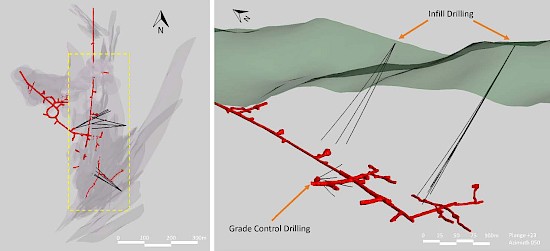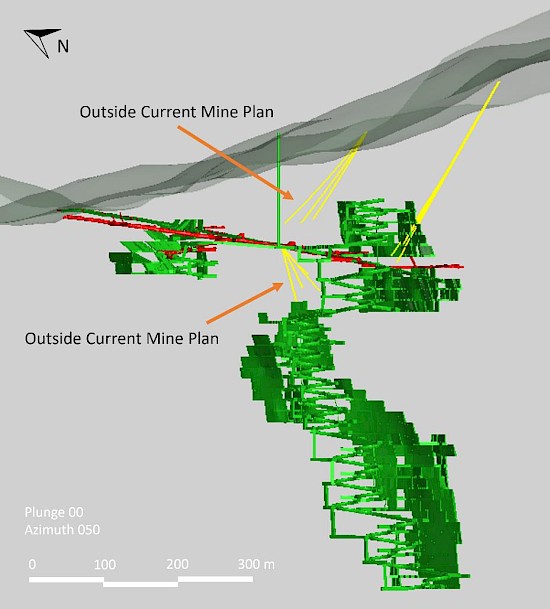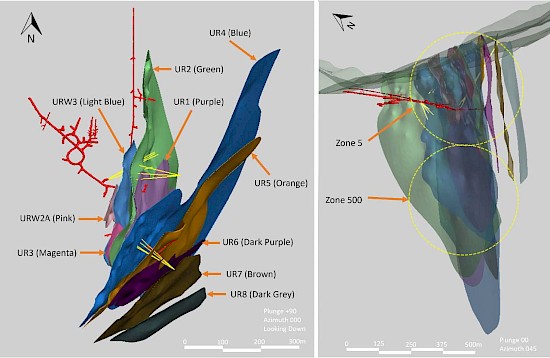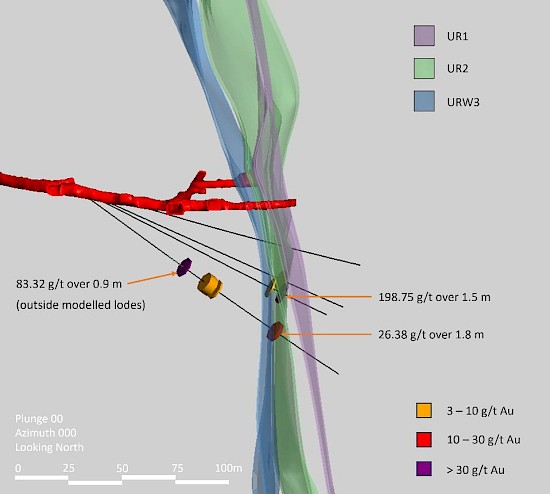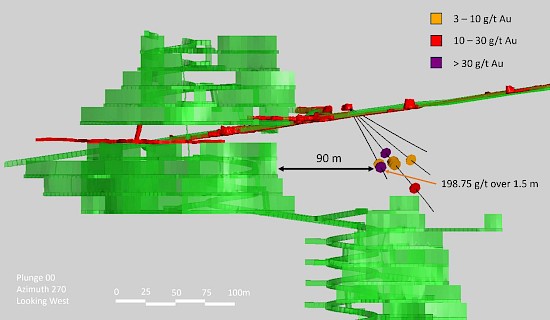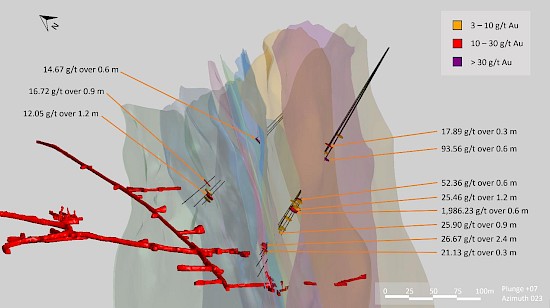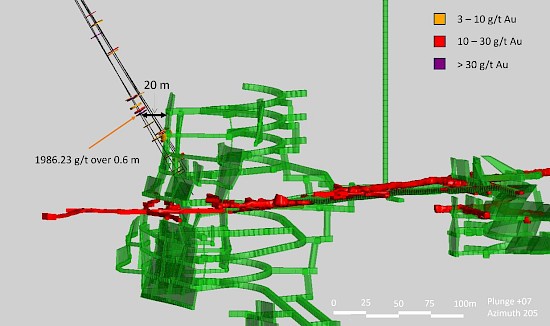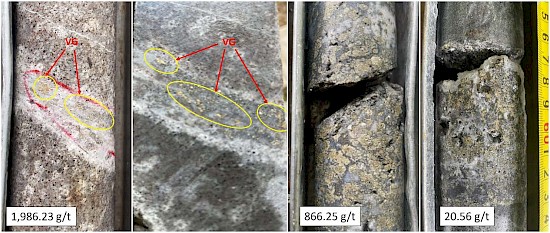Bonanza Grade Gold Intersected Outside Current Mine Plan
North Vancouver, B.C., December 13, 2023 - Lion One Metals Limited (TSX-V: LIO) (OTCQX: LOMLF) (ASX: LLO) (“Lion One” or the “Company”) is pleased to report significant new high-grade gold results from ongoing infill and grade control drilling at its 100% owned Tuvatu Alkaline Gold Project in Fiji.
Assay results are presented here for infill and grade control drilling completed in the Zone 5 area of Tuvatu and include multiple bonanza grade gold results such as 1,986.23 g/t, 866.25 g/t, 135.60 g/t, 115.86 g/t, and many more. These exceptional drill intercepts are all located in the near surface portion of Tuvatu and are scheduled for mining in 2024 and 2025. Most of the drill holes included in this news release targeted areas outside the current mine plan and are being brought into an updated mine plan for 2024. These results therefore represent an expansion of the current near-term mine plan.
Lion One Chairman and CEO Walter Berukoff commented: “We’re very pleased with the results from our Zone 5 infill and grade control drill program. These incredible results add to the growing list of exceptional drill results returned from Tuvatu and provide strong support for our ongoing mining efforts in Zone 5. We’re excited to expand our near-term mine plan in Zone 5 and look forward to mining these areas in 2024 and 2025.”
Highlights of results (3.0 g/t cutoff):
- 1986.23 g/t Au over 0.6 m (TUDDH-696, from 206.1 m depth)
- 198.75 g/t Au over 1.5 m (including 866.25 g/t Au over 0.3 m) (TGC-0116, from 109.9 m depth)
- 83.32 g/t Au over 0.9 m (TGC-0114, from 69.0 m depth)
- 26.67 g/t Au over 2.4 m (including 135.60 g/t Au over 0.3 m) (TUDDH-688, from 247.7 m depth)
- 93.56 g/t Au over 0.6 m (TUDDH-681, from 138.0 m depth)
- 26.38 g/t Au over 1.8 m (including 61.48 g/t Au over 0.3 m) (TGC-0114, from 125.7 m depth)
- 7.79 g/t Au over 4.5 m (including 20.55 g/t Au over 0.9 m) (TGC-0114, from 82.2 m depth)
- 52.36 g/t Au over 0.6 m (TUDDH-696, from 192.9 m depth)
- 25.46 g/t Au over 1.2 m (TUDDH-696, from 203.4 m depth)
- 25.90 g/t Au over 0.9 m (TUDDH-692, from 226.0 m depth)
Previous results from Zone 5 are available in the news releases dated November 2, 2023, August 10, 2023, and June 14, 2023.
Figure 1. Location of Zone 5 Infill and Grade Control Drillholes. Left image: Plan view of Tuvatu showing Zone 5 infill and grade control drillholes in relation to the mineralized lodes at Tuvatu. Drillholes are shown in black, mineralized lodes in pale grey, and underground developments in red. The yellow dashed square represents the area illustrated in the image on the right. Right image: Oblique view of Zone 5 infill and grade control drilling looking approximately northeast. Infill drilling was conducted from surface whereas grade control drilling was conducted from underground.
Figure 2. Location of Zone 5 Infill and Grade Control Drilling in Relation to the Current 5-Year Mine Plan. The grade control drillholes and the northern infill drillholes reported in this news release are targeting areas outside the current 5-year mine plan. The current 5-year mine plan is shown in green, current underground developments in red, and drillholes are shown in yellow for visibility.
Table 1. Highlights of composited grade control and infill drill results in the Zone 5 area. Composites are calculated using a 3 g/t Au cutoff with maximum internal dilution intervals of 1 m at <3 g/t Au. For full results see Table 2 in the appendix.
|
Hole ID |
|
From |
To |
Interval (m) |
Au (g/t) |
|
TUDDH-696 |
|
206.1 |
206.7 |
0.6 |
1986.23 |
|
TGC-0116 |
|
109.9 |
111.4 |
1.5 |
198.75 |
|
including |
110.8 |
111.4 |
0.6 |
491.06 |
|
|
which includes |
110.8 |
111.1 |
0.3 |
866.25 |
|
|
and |
111.1 |
111.4 |
0.3 |
115.86 |
|
|
TGC-0114 |
|
69 |
69.9 |
0.9 |
83.32 |
|
TUDDH-688 |
|
247.7 |
250.1 |
2.4 |
26.67 |
|
including |
247.7 |
248.6 |
0.9 |
22.56 |
|
|
which includes |
248.0 |
248.6 |
0.6 |
31.95 |
|
|
and also including |
249.2 |
250.1 |
0.9 |
48.33 |
|
|
which includes |
249.8 |
250.1 |
0.3 |
135.60 |
|
|
TUDDH-681 |
|
138.0 |
138.6 |
0.6 |
93.56 |
|
TGC-0114 |
|
125.7 |
127.5 |
1.8 |
26.38 |
|
including |
125.7 |
126.0 |
0.3 |
9.97 |
|
|
and |
126.0 |
126.3 |
0.3 |
35.56 |
|
|
and |
126.3 |
126.6 |
0.3 |
61.48 |
|
|
and |
126.6 |
126.9 |
0.3 |
25.52 |
|
|
and |
126.9 |
127.5 |
0.6 |
12.89 |
|
|
TGC-0114 |
|
82.2 |
86.7 |
4.5 |
7.79 |
|
including |
82.2 |
83.1 |
0.9 |
20.55 |
|
|
and |
84.0 |
84.9 |
0.9 |
11.46 |
|
|
TUDDH-696 |
|
192.9 |
193.5 |
0.6 |
52.36 |
|
TUDDH-696 |
|
203.4 |
204.6 |
1.2 |
25.46 |
|
TUDDH-692 |
|
226.0 |
226.9 |
0.9 |
25.90 |
|
TUDDH-688 |
|
230.6 |
233.0 |
2.4 |
9.11 |
|
including |
230.6 |
231.5 |
0.9 |
17.70 |
|
|
which includes |
230.9 |
231.5 |
0.6 |
23.24 |
|
|
and also including |
232.7 |
233.0 |
0.3 |
12.23 |
|
|
TUDDH-695 |
|
149.6 |
150.5 |
0.9 |
16.72 |
|
including |
149.9 |
150.2 |
0.3 |
20.89 |
|
|
and |
150.2 |
150.5 |
0.3 |
20.56 |
|
|
TUDDH-692 |
|
154.0 |
154.6 |
0.6 |
25.05 |
|
TUDDH-690 |
|
163.9 |
165.1 |
1.2 |
12.05 |
|
including |
163.9 |
164.5 |
0.6 |
13.50 |
|
|
and |
164.5 |
165.1 |
0.6 |
10.60 |
|
|
TUDDH-681 |
|
198.6 |
200.1 |
1.5 |
9.59 |
|
including |
199.5 |
200.1 |
0.6 |
15.37 |
Zone 5
The Zone 5 area of Tuvatu is located along the main decline and includes the principal north-south oriented lodes at Tuvatu (UR1, UR2, UR3), the principal northeast-southwest oriented lodes (UR4 to UR8), and several smaller lodes to the west of the main decline (URW2, URW2A, URW3). The lodes in Zone 5 are all steeply dipping structures. Zone 5 represents the upward extension of the Zone 500 feeder zone, which consists of a wide zone of very high-grade mineralization containing intercepts such as 20.86 g/t Au over 75.9 m (TUG-141) and 17.52 g/t Au over 23.7 m (TUDDH-608).
A total of 4 grade control and 8 infill drillholes are included in this news release. The grade control and infill drillholes reported here represent a continuation of the Zone 5 drill program reported in the November 2, 2023 news release.
Figure 3. Main Zone at Tuvatu. Left image: Plan view of Tuvatu identifying the lodes referenced in this report. Right image: Section view looking northeast, showing the location of Zone 5 and Zone 500 relative to the lodes. Drillholes reported in this news release are shown in yellow for visibility.
Grade Control Drilling
The purpose of the Zone 5 grade control drill program is to provide a detailed understanding of the mineralization and geometry of the UR1, UR2, and URW3 lodes both above and below the main decline. The grade control drillholes reported in this news release were designed to target an area down-dip of the current underground developments, as well as to test the northern extension of the UR1 lode proximal to the main decline. The grade control drillholes reported here were drilled on 20 m centers and will be followed up with additional drilling to increase drill density to 10 m centers in advance of mining. The area targeted by these grade control drillholes is outside the current PEA mine plan but is being brought into the mine plan for 2024. This includes the bonanza grade intersect of 866.25 g/t gold, which occurs within a 1.5 m interval of 198.75 g/t gold.
Figure 4. Location of High-Grade Gold Intercepts from Zone 5 Grade Control Drilling, 3.0 g/t cutoff. High-grade gold intervals from Zone 5 grade control drillholes reported in this news release. The grade control drilling targeted sections of the UR1, UR2, and URW3 lodes below current underground developments, shown in red. Select high-grade intervals are identified. View is looking north.
Figure 5. Location of Zone 5 Grade Control Intercepts in Relation to the Current Mine Plan. The grade control drilling reported here is targeting an area approximately 90m north of the current mine plan, shown in green. These high-grade intercepts represent an extension to the mine plan. View is to the west.
Infill Drilling
The purpose of the Zone 5 infill drill program is to increase knowledge and grade continuity in the portions of the UR1 to UR7 lodes located between the surface and the underground developments and to further de-risk this portion of the deposit. The infill drillholes reported in this news release consist of a northern group and a southern group. The northern group of infill drillholes were designed to infill the up-dip portions of the UR1, UR2, and URW3 lodes and to test the northern extension of the UR1 lode. These drillholes targeted areas outside the current mine plan. The southern group of infill drillholes were designed to infill the up-dip portions of the UR1 to UR5 lodes in the southern part of the deposit, and to test the northern extension of the UR6 lode. The areas targeted by infill drilling are scheduled for mining in 2024 and 2025.
Figure 6. Location of High-Grade Gold Intercepts from Zone 5 Infill Drilling, 3.0 g/t cutoff. High-grade gold intervals from Zone 5 infill drillholes reported in this news release. Select high-grade intervals are identified. View is looking approximately NNE.
Figure 7. Location of Select Zone 5 High-Grade Infill Intercepts in Relation to the Current Mine Plan. The 1983.23 g/t gold intercept is located approximately 20 m outside the current mine plan and is scheduled to be mined in 2024. View is looking approximately south-southeast.
Figure 8. Example Mineralization from Zone 5 Infill and Grade Control Drilling. Left: Chalcedonic quartz vein with pyrite, sphalerite and coarse-grained gold up to 1 cm in size, within potassically altered monzonite. Visible gold identified in circles (TUDDH-696, 206.4 m). Middle left: Same interval as left image, with close-up view of cut core revealing extensive visible gold within the quartz vein (TUDDH-696, 206.4 m). Middle right: Coarse pyrite and honey sphalerite within moderately vuggy quartz vein (TGC-0116, 111.0 m). Right: Coarse pyrite and honey sphalerite within vuggy quartz vein (TUDDH-695, 150.1 m). The examples of mineralization shown here are from the sample area reported in this release with full assay results included in Appendix 1. Width of core is 4.76 cm in each photo.
CAUTIONARY STATEMENT
Visual estimates of mineral abundance should never be considered a proxy or substitute for laboratory analyses where metal concentrations or grades are the factors of principal economic interest. At Tuvatu, coarse visible gold generally correlates well to high-grade mineralization. However, the actual grades can only be determined by systematic sampling and assaying, results of which are included in Appendix 1.
Awards under the Omnibus Equity Incentive Plan
The Board has approved a grant of an aggregate of 6,630,000 options to various employees, consultants, officers, and directors of the Company. The objective of the Omnibus Equity Plan is to create an incentive compensation program that is aligned with the Company’s long-term objectives. Stock options are granted in accordance with Policy 4.4 – Security Based Compensation of the TSX Venture Exchange (the “Exchange”) and the terms and conditions of the 2022 Omnibus Equity Incentive Plan. The options were granted at a price of $1.00 for a 5-year term in accordance with the following vesting schedule: 1/3 of the stock options vesting on the date of the grant; 1/3 of the stock options vesting one year following the grant date; and the remaining 1/3 of the options vesting 2 years following the grant date.
Qualified Person
In accordance with National Instrument 43-101 – Standards of Disclosure for Mineral Projects (“NI 43- 101”), Sergio Cattalani, P.Geo, Senior Vice President Exploration, is the Qualified Person for the Company and has reviewed and is responsible for the technical and scientific content of this news release.
QAQC Procedures
Lion One adheres to rigorous QAQC procedures above and beyond basic regulatory guidelines in conducting its drilling, sampling, testing, and analyses. The Company operates its own geochemical assay laboratory and its own fleet of 7 diamond drill rigs using PQ, HQ and NQ sized drill rods.
Diamond drill core samples are logged and split by Lion One personnel on site and delivered to the Lion One Laboratory for preparation and analysis. All samples are pulverized at the Lion One lab to 85% passing through 75 microns and gold analysis is carried out using fire assay with an AA finish. Samples that return grades greater than 0.50 g/t Au are re-assayed three times to get two assays within 10% of each other. Samples that return grades greater than 10.00 g/t Au are re-analyzed by gravimetric method, which is considered more accurate for very high-grade samples.
Duplicates of all samples with grades above 0.5 g/t Au are also delivered to ALS Global Laboratories in Australia for check assay determinations using the same methods (Au-AA26 and Au-GRA22 where applicable). ALS also analyses 33 pathfinder elements by HF-HNO3-HClO4 acid digestion, HCl leach and ICP-AES (method ME-ICP61). The Lion One lab can test a range of up to 71 elements through Inductively Coupled Plasma Optical Emission Spectrometry (ICP-OES), but currently focuses on a suite of 9 important pathfinder elements.
The Lion One lab has implemented the Laboratory Information Management System (LIMS) to automate workflows, integrate instruments, and effectively manage samples and associated data across all analyses conducted in the lab.
About Lion One Metals Limited
Lion One Metals is an emerging Canadian gold producer headquartered in North Vancouver BC, focused on advancing its flagship 100% owned Tuvatu Alkaline Gold Project in Fiji. Gold production at Tuvatu was established in late 2023 following construction of the Company’s 300 TPD pilot plant. The Tuvatu project comprises the high-grade Tuvatu Alkaline Gold Deposit, the Underground Gold Mine, the Pilot Plant, and the Assay Lab. The Company also has an extensive exploration license covering the entire Navilawa Caldera, which is host to multiple mineralized zones and highly prospective exploration targets. Lion One Metals is operated by a team of mining professionals with extensive international mine-building and operational experience.
As disclosed in its “Technical Report and PEA Update for the Tuvatu Gold Project”, dated April 29, 2022, the 2018 Tuvatu resource estimate comprises 1,007,000 tonnes indicated at 8.50 g/t Au (274,600 oz. Au) and 1,325,000 tonnes inferred at 9.0 g/t Au (384,000 oz. Au) at a cut-off grade of 3.0 g/t Au. The technical report is available on the Lion One website at www.liononemetals.com and under the Lion One profile on the SEDAR+ website at www.sedarplus.ca.
On behalf of the board of Lion One Metals Limited,
Walter Berukoff, Chairman & CEO
Patrick Hickey, Chief Operating Officer
Contact Information
Investor inquiries: info@liononemetals.com
Phone: 1-855-805-1250 (toll free North America)
Website: www.liononemetals.com
Neither the TSX-V nor its Regulation Service Provider accepts responsibility or the adequacy or accuracy of this release
This press release may contain statements that may be deemed to be "forward-looking statements" within the meaning of applicable Canadian securities legislation. All statements, other than statements of historical fact, included herein are forward-looking information. Generally, forward-looking information may be identified by the use of forward-looking terminology such as "plans", "expects" or "does not expect", "proposed", "is expected", "budget", "scheduled", "estimates", "forecasts", "intends", "anticipates" or "does not anticipate", or "believes", or variations of such words and phrases, or by the use of words or phrases which state that certain actions, events or results may, could, would, or might occur or be achieved. This forward-looking information reflects Lion One Metals Limited’s current beliefs and is based on information currently available to Lion One Metals Limited and on assumptions Lion One Metals Limited believes are reasonable. These assumptions include, but are not limited to, the actual results of exploration projects being equivalent to or better than estimated results in technical reports, assessment reports, and other geological reports or prior exploration results. Forward-looking information is subject to known and unknown risks, uncertainties and other factors that may cause the actual results, level of activity, performance or achievements of Lion One Metals Limited or its subsidiaries to be materially different from those expressed or implied by such forward-looking information. Such risks and other factors may include, but are not limited to: the stage development of Lion One Metals Limited, general business, economic, competitive, political and social uncertainties; the actual results of current research and development or operational activities; competition; uncertainty as to patent applications and intellectual property rights; product liability and lack of insurance; delay or failure to receive board or regulatory approvals; changes in legislation, including environmental legislation, affecting mining, timing and availability of external financing on acceptable terms; not realizing on the potential benefits of technology; conclusions of economic evaluations; and lack of qualified, skilled labour or loss of key individuals. Although Lion One Metals Limited has attempted to identify important factors that could cause actual results to differ materially from those contained in forward-looking information, there may be other factors that cause results not to be as anticipated, estimated or intended. Accordingly, readers should not place undue reliance on forward-looking information. Lion One Metals Limited does not undertake to update any forward-looking information, except in accordance with applicable securities laws.
Appendix 1: Full Drill Results and Collar Information
Table 2. Composited results from grade control and infill drillholes in the Zone 5 area (grade >3.0 g/t Au)
|
Hole ID |
|
From |
To |
Interval (m) |
Au (g/t) |
|
TGC-0109 |
|
116.7 |
117.3 |
0.6 |
3.85 |
|
TGC-0114 |
|
69 |
69.9 |
0.9 |
83.32 |
|
TGC-0114 |
|
82.2 |
86.7 |
4.5 |
7.79 |
|
including |
82.2 |
83.1 |
0.9 |
20.55 |
|
|
and |
84.0 |
84.9 |
0.9 |
11.46 |
|
|
and |
85.8 |
86.7 |
0.9 |
6.95 |
|
|
TGC-0114 |
|
88.5 |
89.4 |
0.9 |
5.87 |
|
TGC-0114 |
|
125.7 |
127.5 |
1.8 |
26.38 |
|
including |
125.7 |
126.0 |
0.3 |
9.97 |
|
|
and |
126.0 |
126.3 |
0.3 |
35.56 |
|
|
and |
126.3 |
126.6 |
0.3 |
61.48 |
|
|
and |
126.6 |
126.9 |
0.3 |
25.52 |
|
|
and |
126.9 |
127.5 |
0.6 |
12.89 |
|
|
TGC-0116 |
|
104.2 |
105.1 |
0.9 |
3.69 |
|
TGC-0116 |
|
109.9 |
111.4 |
1.5 |
198.75 |
|
including |
110.8 |
111.4 |
0.6 |
491.06 |
|
|
which includes |
110.8 |
111.1 |
0.3 |
866.25 |
|
|
and |
111.1 |
111.4 |
0.3 |
115.86 |
|
|
TUDDH-681 |
|
138.0 |
138.6 |
0.6 |
93.56 |
|
TUDDH-681 |
|
191.7 |
192.3 |
0.6 |
6.17 |
|
TUDDH-681 |
|
198.6 |
200.1 |
1.5 |
9.59 |
|
including |
198.6 |
199.5 |
0.9 |
5.74 |
|
|
and |
199.5 |
200.1 |
0.6 |
15.37 |
|
|
TUDDH-685 |
|
129.8 |
130.7 |
0.9 |
6.11 |
|
TUDDH-685 |
|
225.2 |
225.8 |
0.6 |
4.51 |
|
TUDDH-685 |
|
227.6 |
228.8 |
1.2 |
9.60 |
|
including |
227.6 |
228.2 |
0.6 |
6.68 |
|
|
and |
228.2 |
228.8 |
0.6 |
12.52 |
|
|
TUDDH-685 |
|
251.6 |
251.9 |
0.3 |
21.13 |
|
TUDDH-688 |
|
155.3 |
155.9 |
0.6 |
5.60 |
|
TUDDH-688 |
|
193.1 |
193.7 |
0.6 |
4.57 |
|
TUDDH-688 |
|
228.2 |
228.5 |
0.3 |
11.97 |
|
TUDDH-688 |
|
230.6 |
233.0 |
2.4 |
9.11 |
|
including |
230.6 |
231.5 |
0.9 |
17.70 |
|
|
which includes |
230.6 |
230.9 |
0.3 |
6.61 |
|
|
and |
230.9 |
231.5 |
0.6 |
23.24 |
|
|
and also including |
232.1 |
232.7 |
0.6 |
3.47 |
|
|
and |
232.7 |
233.0 |
0.3 |
12.23 |
|
|
TUDDH-688 |
|
247.7 |
250.1 |
2.4 |
26.67 |
|
including |
247.7 |
248.6 |
0.9 |
22.56 |
|
|
which includes |
247.7 |
248.0 |
0.3 |
3.78 |
|
|
and |
248.0 |
248.6 |
0.6 |
31.95 |
|
|
and also including |
249.2 |
250.1 |
0.9 |
48.33 |
|
|
which includes |
249.2 |
249.8 |
0.6 |
4.70 |
|
|
and |
249.8 |
250.1 |
0.3 |
135.60 |
|
|
TUDDH-690 |
|
163.9 |
165.1 |
1.2 |
12.05 |
|
including |
163.9 |
164.5 |
0.6 |
13.50 |
|
|
and |
164.5 |
165.1 |
0.6 |
10.60 |
|
|
TUDDH-690 |
|
168.1 |
168.4 |
0.3 |
5.93 |
|
TUDDH-692 |
|
122.1 |
122.4 |
0.3 |
17.89 |
|
TUDDH-692 |
|
154.0 |
154.6 |
0.6 |
25.05 |
|
TUDDH-692 |
|
226.0 |
226.9 |
0.9 |
25.90 |
|
TUDDH-692 |
|
228.1 |
230.8 |
2.7 |
4.52 |
|
including |
228.1 |
228.7 |
0.6 |
6.57 |
|
|
and |
228.7 |
229.3 |
0.6 |
6.30 |
|
|
and |
229.6 |
230.2 |
0.6 |
4.24 |
|
|
and |
230.2 |
230.8 |
0.6 |
3.26 |
|
|
TUDDH-692 |
|
250.6 |
250.9 |
0.3 |
5.27 |
|
TUDDH-693 |
|
81.7 |
82.3 |
0.6 |
14.67 |
|
TUDDH-693 |
|
157.1 |
158.3 |
1.2 |
6.36 |
|
including |
157.1 |
157.4 |
0.3 |
4.40 |
|
|
and |
157.4 |
157.7 |
0.3 |
8.68 |
|
|
and |
158.0 |
158.3 |
0.3 |
12.02 |
|
|
TUDDH-695 |
|
149.6 |
150.5 |
0.9 |
16.72 |
|
including |
149.9 |
150.2 |
0.3 |
20.89 |
|
|
and |
150.2 |
150.5 |
0.3 |
20.56 |
|
|
TUDDH-696 |
|
110.1 |
110.7 |
0.6 |
9.73 |
|
TUDDH-696 |
|
192.9 |
193.5 |
0.6 |
52.36 |
|
TUDDH-696 |
|
203.4 |
204.6 |
1.2 |
25.46 |
|
TUDDH-696 |
|
206.1 |
206.7 |
0.6 |
1986.23 |
|
TUDDH-696 |
|
216.6 |
216.9 |
0.3 |
6.20 |
|
TUDDH-696 |
|
228.6 |
229.2 |
0.6 |
7.88 |
|
TUDDH-696 |
|
244.8 |
245.1 |
0.3 |
3.86 |
|
TUDDH-696 |
|
256.2 |
256.5 |
0.3 |
9.26 |
|
TUDDH-696 |
|
258.9 |
259.2 |
0.3 |
25.08 |
|
TUDDH-696 |
|
261.0 |
261.3 |
0.3 |
3.81 |
Table 3. Collar coordinates for grade control and infill drillholes reported in this release. Coordinates are in Fiji map grid.
|
Hole ID |
Easting |
Northing |
Elevation |
Azimuth |
Dip |
Depth |
|
TGC-0109 |
1876383 |
3920628 |
128 |
60.5 |
-21.5 |
152.2 |
|
TGC-0112 |
1876383 |
3920628 |
128 |
58.5 |
-14.3 |
152.0 |
|
TGC-0114 |
1876383 |
3920628 |
127 |
59.7 |
-32.0 |
165.7 |
|
TGC-0116 |
1876384 |
3920627 |
127 |
74.4 |
-26.1 |
134.2 |
|
TUDDH-681 |
1876557 |
3920390 |
353 |
309.1 |
-60.5 |
284.6 |
|
TUDDH-685 |
1876557 |
3920390 |
352 |
309.2 |
-58.1 |
260.6 |
|
TUDDH-688 |
1876557 |
3920390 |
352 |
301.4 |
-60.1 |
260.6 |
|
TUDDH-690 |
1876573 |
3920637 |
284 |
264.3 |
-46.1 |
176.0 |
|
TUDDH-692 |
1876557 |
3920390 |
353 |
300.2 |
-58.9 |
251.5 |
|
TUDDH-693 |
1876573 |
3920637 |
284 |
270.8 |
-45.4 |
180.0 |
|
TUDDH-695 |
1876573 |
3920637 |
284 |
282.7 |
-44.0 |
185.0 |
|
TUDDH-696 |
1876557 |
3920390 |
352 |
311.2 |
-60.0 |
280.0 |

